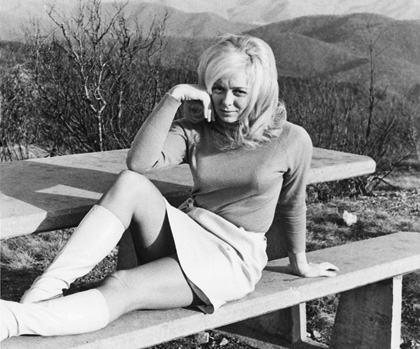Festivals
London Film Festival 2010: The S&S blog
Errol Morris’s Tabloid

Isabel Stevens, 17 October
The story goes that Errol Morris’s wife once went to collect some books for her husband. Unable to find the reserved items, the assistant in the bookshop asked her if she knew the names of the titles. No, she said, but I know the subjects: “they’re probably about insanity, murder or Nazis”.
In his documentaries Morris has tackled such heavy subjects as the Texas justice system and the Vietnam War. His last film took on the US military over the torture photographs from Abu Ghraib. In comparison, his latest offering looks like it was rather fun to make, and it’s undoubtedly his most entertaining film to date: Tabloid is a portrait of Joyce McKinney, a former Miss Wyoming who in 1977 set the British media on fire when she allegedly abducted a Mormon man and forced him to have sex against his will.
“It’s a fairytale. As such it’s very perverse and demented,” was producer Mark Lipson’s introduction to the screening on Saturday night. (Morris was sadly absent.) Certainly, I challenge you to find another film this year that will raise your eyebrows so frequently over 87 minutes; it’s surprising even to those familiar with the tale of ‘the manacled Mormon’.
Tabloid is visually jazzier than Morris’s previous works – in addition to animated sequences and fiction-film clips, tabloid headlines flash intermittently across the screen. And who would have thought a Morris film could be so funny? Instead of the odd moments of the dark humour we have become accustomed to, Tabloid periodically had the audiences in stitches, no small thanks to McKinney herself, a very chatty, charismatic interviewee.
Yet underneath the tales of temple garments, chains and beauty queens lies Morris’ true subject: the slipperiness of the truth. As he investigates the tabloid furore that ignited around McKinney (one which she was initially more than happy to fuel), testimony and fantasy become inextricable. As a then-Daily Express reporter notes, “the truth is somewhere in between.”
Morris calls the film “a love story”; no doubt some will beg to differ. But to his credit, everyone will walk out of this film with their own interpretation of the truth. And unlike a good number of documentary makers, Morris is not out to hang his subject. We might be suspicious of McKinney’s version of events, but it’s impossible not to be a little bit seduced by her too.
“She seems like a woman who could be your best friend when she liked you and your worst enemy when she didn’t,” commented one member of the audience, going on to ask what everyone wanted to know: what was Joyce’s reaction to the completed film?
Lipson’s pithy response: “Your question was the summation of the situation.”
Correction (25 October 2010): This post originally referred to the producer attending the Q&A as Robert Fernandez, who executive-produced the film. The actual producer in question was Mark Lipson. This has been corrected above.
Uncle Boonmee Who Can
Remember His Past Lives »
See also
London Film Festival 2010: 30 recommendations (online, October 2010)
Documentary: shaking the world: Mark Cousins wonders whether documentaries can change history (September 2007)
Warmonger blues: J Hobermann on Errol Morris’s The Fog of War (April 2004)
